- Home
- Alice Hoffman
Angel Landing Page 16
Angel Landing Read online
Page 16
“Is that the story you intend to give out during the trial when every reporter in the state finds out you were the bomber’s therapist?”
“I wish you wouldn’t call him the bomber,” I said. “And yes, there’s only one story.”
“How boring,” Lark said.
“I really can’t believe you read through his file,” I said, but Lark wasn’t listening to me, she was thinking hard. She licked her lips. “I know. Send the reporters to me.”
“You?” I said. “What do you know about Michael Finn?”
“Nothing,” Lark said. “But I know other case histories that are ten times more interesting than his. EMOTE could really use the publicity. All I need is one or two interviews with the right people.”
Weeks ago, days before, I would have laughed and walked out the door of the café. I was to be the one who stood on the courthouse steps with Finn’s exclusive story, I was the one to write the articles, and then be patted and promoted at Outreach. But now I wanted nothing more than to quickly recite my testimony and then slink from the courtroom in secrecy. The more publicity, the more I had to think about Finn, the longer I would see his face, remember his history.
“All right,” I agreed. “I’ll send them all to you.”
Lark reached for my hand. “You won’t regret it,” she said.
I counted the flecks of salt that had spilled near my plate; they looked like peculiar insects edging toward me.
“Natalie,” Lark said now, “what’s wrong?”
If I counted the brown spots on every french fry on my plate I might be able to forget the way Finn’s voice dropped whenever he talked about the past.
Lark waved her hand in front of my face. “Are you still here?”
“If you really want to know,” I said. “I’m miserable.”
Lark slapped the tabletop. “This really makes me happy,” she said. “You’re finally opening up to me. You’re beginning to trust me.”
“I’ll he all right,” I said quickly.
“All right? You won’t be all right unless you do something to help yourself. And what you can do to help yourself is to come to EMOTE.”
“I don’t think so,” I said.
“Just give it a chance,” Lark said. “What do you have to lose?”
“If I did come to an EMOTE meeting I wouldn’t discuss my personal life. I would just be an observer.”
“Fine,” Lark said, as she reached for the check. “Just keep an open mind.”
But an open mind was something I did not have on the evening when I followed Lark’s instructions and arrived at her cottage on the grounds of a Shore Road estate. I was fairly certain that if there was anything that could chase away my doubts, it wasn’t EMOTE. Still, I had promised to appear at the meeting, and so I borrowed Minnie’s Mustang and parked at the end of a long line of cars. I walked up the driveway and knocked on Lark’s front door.
As soon as Lark spotted me, she strode across the living room and took my hand.
“I’m so happy you’re here,” she said. “The trust that is growing between us is amazing.”
I edged to the rear of the room.
“Friends,” Lark said, and all eyes turned toward her. “It’s time to begin our work,” she said solemnly.
The participants obediently carried their coffee mugs, and then, grunting softly like a flock of sheep, they ranged themselves in a semicircle on the floor, sitting on pillows or on a pumpkin-colored oriental rug. In the center of the circle was a tall object hidden from view by a draped Indian bedspread. As Lark went to stand in front of the bedspread I crept farther into the background, hoping that the shadows in the corner would hide my skepticism. But a young man, dressed all in white, glared at me.
“I’d like to speak now,” the young man called out. “Lark, I have something I’d like to say.”
“You are talking to Lark,” Lark intoned.
“You are talking to Sandy,” the young man in white said as he stood.
“What would you like to say?” Lark asked pleasantly.
“I would like to know why we’re being observed as if we were animals in a zoo.”
“Now, Sandy,” Lark smiled. “What are you really saying?”
“I’m talking about her.” He pointed a finger at me. “Why is she creeping around in the corners of the room, why does she refuse to join the group? Does she think that she’s better than we are?”
“Oh, not at all,” I cried out apologetically.
“I’m sorry,” Sandy shrugged. “I just can’t get into somebody watching us. Either she’s with us or she’s not. She’s in or she’s out.”
“Why don’t you take a seat,” Lark said to me.
I didn’t have a seat because I wanted the option of bolting through the front door if I cared to. I didn’t have a coffee mug in my hands because I wanted my fingers free to fight off any angry member of this cult who might suddenly decide to attack an outsider. Still, I didn’t have the courage to stick out my tongue and slam the door behind me, and somewhere I had some hope, however tiny, that EMOTE might help me understand how my emotions had gone out of control. So I joined the circle, I sat on a blue and green striped pillow and smiled at the group around me.
“How do you feel now, Sandy?” Lark asked.
“I feel accepted,” Sandy grinned as he sank back to his pillow. “I really do.” He nodded at me.
“Well, now,” Lark called out briskly. “Is everyone ready?”
“Readier than we’ve ever been,” the members of EMOTE called.
I reached into my purse and took out the pack of cigarettes I had specially brought along.
“No smoking,” the woman on the pillow next to me said. “We don’t hate our bodies here.”
I put away my cigarettes and looked up just as Lark reached to pull the Indian bedspread down. There, beneath the drape, was a six-foot mirror framed in oak. We, who sat on the floor, were now confronted by our reflections in the glass.
“Applaud yourself,” Lark called out.
All around me people cheered; because I didn’t wish to be accused of being an outside observer, I also began to clap.
“What are you clapping for?” the woman nearest to me hissed. “You haven’t been through EMOTE. You don’t know a thing about the technique.”
“Who would like to begin?” Lark called out.
“I would,” the woman to my left cried out. “You’re talking to Denise,” she said as she stood.
We all applauded as Denise walked to face the mirror. She smoothed down her long blond hair. “I’m ready.” Denise nodded.
“All right then,” Lark said softly, moving from the center of the circle. “What do we have to say to Denise?”
A man with closely cropped hair and a gold hoop through his left ear stood up. “You’re a terrible mother. You should be punished. You should be sent away to an institution where you would never be allowed to see children again,” he said evenly.
“I’m a good mother,” Denise said into the mirror. “I can be whatever I want to be, and I want to be a good mother.”
“How can a whore be a good mother?” Sandy called out.
Lark came to sit next to me on the floor. “The best method for ego building,” she told me. “Force them to fight against criticism and take control of their own destinies.”
“Interesting,” I murmured as Denise spoke to her reflection. “Of course, there are always outside forces. Environment. The family.”
Lark shook her head. “A strong ego can get through all of that.”
As I watched Denise finish her ego-building exercises, I wondered what would have happened if Michael Finn had sat before that mirror. Would all of his pain and hostility have simply dissolved? And if I sat there now, would I be able to convince myself that I could be whatever I wanted to be—beloved or loner, it was all up to me. Denise had finished and the group applauded energetically; and when she returned to her pillow her cheeks glowed a faint rose color. As I tho
ught about Denise, Sandy began to clap his hands rhythmically on the other side of the circle. “No observers,” Sandy sang as he clapped. “No observers,” he chanted. In no time at all, everyone else had taken up the song, and many of them turned toward me.
“Sandy has a point,” Lark said. “An observer at EMOTE is an observer in life. Get involved,” she urged me.
“I don’t think so,” I said.
“It can’t hurt,” Lark said. “Think of it as an experience.”
“An experience,” I repeated.
“It’s really quite freeing,” Lark said. “Your problems seem to disappear.”
“Problems?” I said. “I wouldn’t say I had problems.”
“Never trust a person who claims to have no problems.” Denise smiled. “Never believe it.”
“You have nothing to lose,” Lark said as she pushed me toward the full-length mirror.
As soon as I stood there I found myself wishing that EMOTE could work some wonderful spell on me, some voodoo which would allow me to slip back into the life I had led before the explosion.
“I can tell, I can see it in your eyes,” Sandy called out to me. “You’re a fool.”
“Oh, I don’t know about that,” I said evenly, as if I were addressing a lunatic I didn’t want to incite.
“Contradict him with a positive statement,” Lark said.
“I’m fairly intelligent,” I told Sandy.
“You’re miserable,” a young woman said. “You’re so depressed you wish you could die.”
“I may be a little depressed.”
“What’s good about your life?” Lark asked. “Tell them. Tell us all.”
“I beg your pardon?” I said.
“Emote,” Sandy said. “Just let it all out.”
“Well,” I said, “I really do care about other people.”
“Other people?” Someone from the back of the room sneered. “We’re not interested in other people. We want to know about you.”
“I’m a hard worker,” I said. “I make good fried chicken,” I told my reflection. “I have nice eyes,” I whispered. “I was always on the dean’s list in college.”
“Someone else’s values,” Lark said, shaking her head. “You’re letting yourself be judged by someone else’s values.”
I studied myself; behind my own reflection Lark’s living room and the members of EMOTE had begun to melt away.
“I’m in love with someone who doesn’t want to get involved,” I said.
“Why should this person care about you?” a voice asked. “What the hell is so good about you?”
I looked into the mirror as if there might be some answer etched onto the glass. “I don’t know.”
“You don’t know,” Denise echoed.
I stood quite still. In that room of crazy believers I felt alone; I bent my head and began to weep.
“Fantastic,” Lark told me. “Let it out.”
I shook my head and tried to speak, but my words came out in short gasps.
“Let all your defenses down. You’ve got to be nothing before you can be something,” Lark told me.
Now all around me the group began the second stage of EMOTE; their voices bubbled with praise, they came to embrace me.
Sandy hugged me so tightly that my tears fell onto his white shirt. “You are an unusual person. A special person,” he told me.
“Five minutes ago you told me I was horrible,” I said.
“Five minutes ago you were horrible,” Sandy smiled.
“Now that you’ve let your defenses down you’re a different person,” Lark said. “You’re beautiful.”
I looked at myself in the mirror; my eyes were red, my nose was running, strands of hair stuck out from my head in crazy, undisciplined wisps. There, in the glass, was the same sad woman who had been there before, only more tired, her nerves ran closer to the surface than ever before.
“I think I’d better be going,” I said as I took a tissue from the box of Kleenex Denise held out to me.
“Running away is everyone’s first reaction when they come to EMOTE,” Lark said. “But you can’t run away from your feelings. You can’t escape.”
“We can make you feel better,” Sandy said earnestly. “We really can.”
My feelings were not something I wished to be helped through, they weren’t something I wanted to leave behind. “I’ve got to be going,” I said. When I stopped at the door to pull on my coat the members of EMOTE rose to their feet and applauded me.
“Thank you,” I said, just before I turned to run. “Thank you all so much.”
I drove the Mustang out the driveway and headed toward town. I couldn’t wait to get out of the neighborhood, away from the huge houses on Shore Road, away from the echo of that parting applause. I didn’t slow down, not even when the Mustang skidded on the turns. I wouldn’t feel safe again until I was back at Minnie’s. There was no short cut, no way around: without Michael Finn I would be lonely for a long time; and if Carter had not been away in New Hampshire I would have driven to the Soft Skies office and let him know that we were through, that every Wednesday night in the world wouldn’t help put the pieces back.
When I reached home I hoped to avoid Minnie; I went in through the back door only to find her at the kitchen table, polishing silverware and humming off-key.
“I’m glad you’re finally home,” she said.
I nodded and kept on walking, right out the kitchen door, and up the stairs. Sleep would be good for me, it would take away desire, and loneliness. When I heard Minnie’s footsteps behind me on the stairs I didn’t look back; I went straight to my room.
“I’m very tired,” I said to Minnie, who continued to stand in my doorway. “I’m exhausted,” I said. I felt so weak that I couldn’t manage to undress properly. “Can you unzip me?”
My aunt took hold of the back of my dress, but she didn’t touch the zipper. “You have a terrible memory,” Minnie said.
“I wish I did,” I said.
“Tomorrow is Thanksgiving,” Minnie said.
“Very nice,” I said. “I’m really happy about that.”
Minnie looked at me more closely. “You look depressed,” she said. “Have you been eating pork?”
“Do you mind? The zipper?”
“This is serious,” Minnie said. “I’m too old to concoct an entire dinner for a horde of guests.”
“What horde?” I asked.
“The old folks from Mercy.”
How much could old people eat, how much could there be to cook? But perhaps Minnie would faint over a hot stove, perhaps an ambulance would be called, and I would be watching them drive her away as I stood at the back door holding a pumpkin pie in my wretched hands. “All right, all right,” I said. “I’ll help.”
Minnie finally released me and unzipped my dress; I immediately sank into bed with a sigh.
“Tell me the truth,” Minnie said. “Are you blue?”
“Blue?” I said. “An entire roomful of people just told me I was a beautiful person.”
Minnie waved a hand impatiently. “What do they know?” she said. “Do they know you the way I do?”
“I’d like to be alone,” I said.
“I’ve got something to pick you right up,” Minnie said.
“Brewer’s yeast,” I guessed.
“Your bomber,” Minnie smiled. “I invited him to Thanksgiving dinner.”
I dropped the quilt and sat up. “What are you talking about?”
“He’s listed in the phone book,” Minnie said. “A party is very boring with only old people.” She shrugged. “It has no juice.”
“He said yes?” I asked.
“Why shouldn’t he say yes?” Minnie said irritably. “You can think what you want, but there are plenty of people who think I’m a good cook, an excellent cook. I know my way around nutrition like a cat knows its way around a garbage can.”
“Oh, Minnie,” I said. “You shouldn’t have invited him.”
“He knows it’s vegetarian,” Minnie assured me. “Don’t worry about that. I said: ‘There will be no turkey in this house, let that be understood once and for all.’”
“How could you?” I said. “Finn is a client, nothing more.”
“Well, he’s coming to dinner and that’s that,” Minnie said. “I’m going to tell you something right now,” Minnie went on, her voice softening, “and you’d better listen, because I’m old and I know. The road to love is rocky. I had quite a number of shocks when I fell in love with Alex. But the biggest shock of all,” Minnie confided, “was that there were plenty of times when it was lonelier to be in love than it was to be on your own. Remember that,” my aunt told me.
“I’m not going to be able to sleep,” I said. “I just know it.”
“What a sweet boy,” Minnie said to herself. She got a familiar faraway look on her face, and I knew she was remembering Alex as he had been so many years ago, long before any Lansky had ever set foot in America.
Downstairs, Beaumont hammered on his raft in the cellar; outside, the temperature continued to drop. I would spend the night tossing and turning, worrying about meeting Finn, wondering if we had a chance.
“Go to sleep,” Minnie told me.
“Now that you invited him, you’ve got me thinking again. I’ll be awake for hours.”
“Just try,” Minnie advised. “Close your eyes.”
Although I didn’t think it would do any good I listened to Minnie. Instead of sheep I counted the number of times Beaumont’s hammer struck wood two floors below. And because my aunt continued to watch over me, the night was filled with the faint odor of lavender, and I didn’t toss or turn at all.
SIX
IT WAS NEARLY NOON THE next day when I went downstairs, to discover the group from the Mercy Home settled into the parlor.
“Look who’s here,” Evie cried when I walked into the room. “You must have a glass of sherry right away. It’s good luck.”
“Too early for me,” I said; but not too early to eye the front door, wondering if Michael Finn could already be just outside, hesitating on the front porch.
Arthur, the old gentleman, came over and took my hand. “Beaumont, that wonderful fellow, picked us up early this morning in the Mustang.”

 The Story Sisters
The Story Sisters Local Girls
Local Girls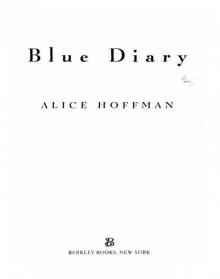 Blue Diary
Blue Diary The River King
The River King Here on Earth
Here on Earth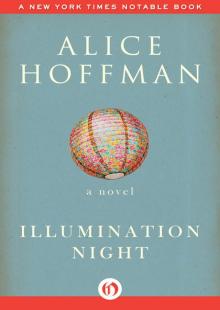 Illumination Night: A Novel
Illumination Night: A Novel The Marriage of Opposites
The Marriage of Opposites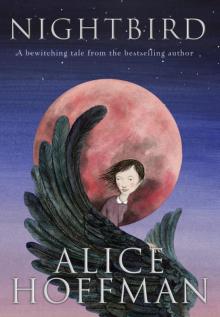 Nightbird
Nightbird Incantation
Incantation Skylight Confessions
Skylight Confessions The Ice Queen
The Ice Queen Second Nature
Second Nature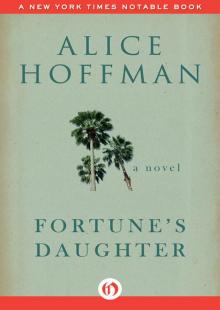 Fortune's Daughter: A Novel
Fortune's Daughter: A Novel Seventh Heaven
Seventh Heaven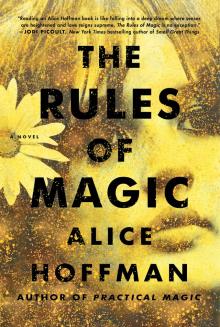 The Rules of Magic
The Rules of Magic The Red Garden
The Red Garden The Third Angel
The Third Angel White Horses
White Horses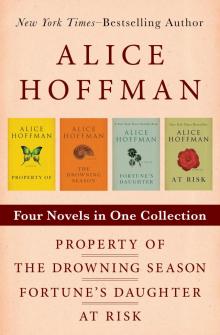 Property of / the Drowning Season / Fortune's Daughter / at Risk
Property of / the Drowning Season / Fortune's Daughter / at Risk Angel Landing
Angel Landing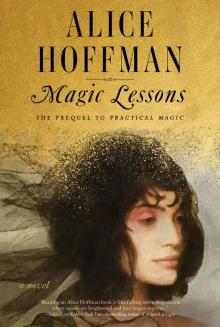 Magic Lessons
Magic Lessons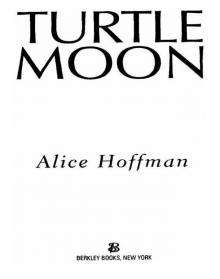 Turtle Moon
Turtle Moon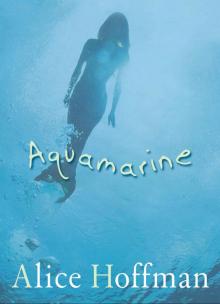 Aquamarine
Aquamarine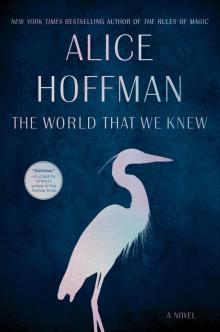 The World That We Knew
The World That We Knew Faithful
Faithful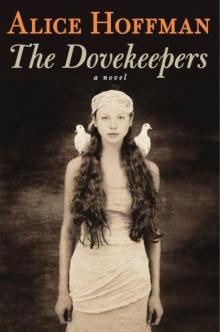 The Dovekeepers
The Dovekeepers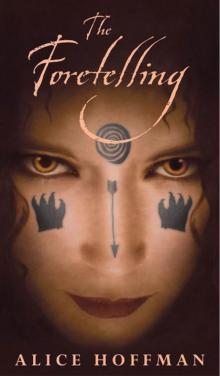 The Foretelling
The Foretelling Green Angel
Green Angel At Risk
At Risk Green Heart
Green Heart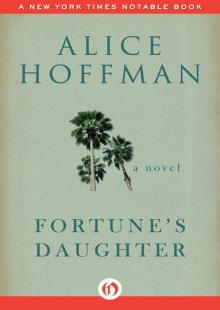 Fortune's Daughter
Fortune's Daughter Faerie Knitting
Faerie Knitting Incantation (v5)
Incantation (v5) Green Witch
Green Witch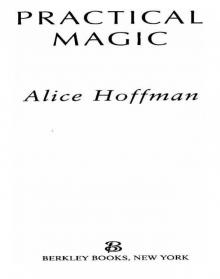 Practical Magic
Practical Magic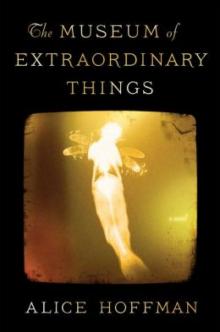 The Museum of Extraordinary Things
The Museum of Extraordinary Things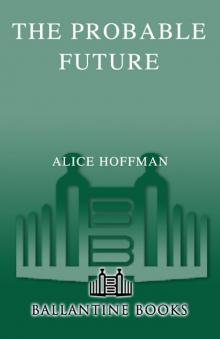 The Probable Future
The Probable Future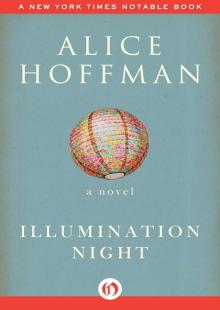 Illumination Night
Illumination Night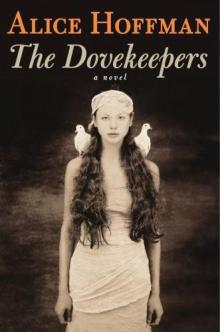 The Dovekeepers: A Novel
The Dovekeepers: A Novel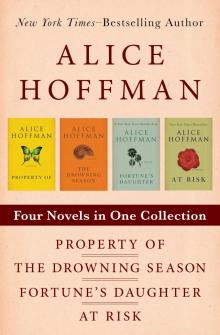 Property Of, the Drowning Season, Fortune's Daughter, and At Risk
Property Of, the Drowning Season, Fortune's Daughter, and At Risk